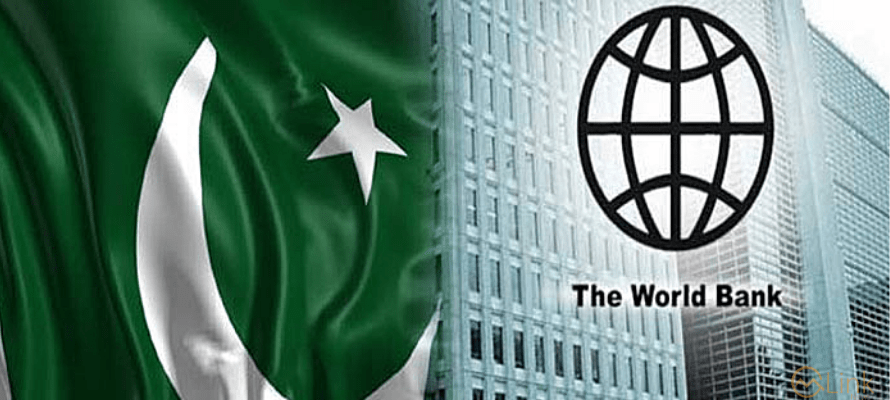World Bank spotlights Pakistan's key development challenges, provides policy framework

By MG News | November 06, 2023 at 12:29 PM GMT+05:00
November 06, 2023 (MLN): Pakistan is at a critical decision point, with several interrelated factors underpinning the country’s inadequate development progress, the World Bank highlights these issues in its latest report under the 'Reforms for a Brighter Future' initiative, aiming to address them and provide a policy framework.
This overview note summarizes a series of eight discussion notes. These notes outline World Bank recommendations across selected policy areas where major reforms are critical for Pakistan’s progress towards inclusive and sustainable development.
While addressing these issues, the entity emphasizes that foremost among them is Pakistan's low human capital and inefficient utilization of available human resources, which hampers productivity, growth, and development.
Pakistan's human development outcomes lag well behind the rest of South Asia and are roughly equivalent to those in many Sub-Saharan African countries, with the costs disproportionately borne by girls and women.
Close to 40% of children under the age of five are stunted and the country has the largest number of out-of¬school children in the world (20.3 million), including 37% of girls and 27% of boys, with boys expected to receive 1.4 years more education than girls on average.
Public investment of about 2.5% of GDP in education and 0.9% in health is much lower than the global average and the average for similar economies.
If Pakistan's human capital outcomes and utilization improved to the level of its peers, per capita GDP growth could almost double (from a projected 18% to 32%) over the next 25 years.
Second, Pakistan faces large and unsustainable fiscal deficits. Pakistan's fiscal deficit has been persistently large and growing, driving debt to unsustainable levels.
High government consumption, often driven by the political cycle, has increased demand for imports, contributing to current account deficits and periodic balance of payments crises.
Post-2010 annual average deficits have been significantly larger than the pre-2010 average, and the general government deficit reached a 22-year high at 7.9% of GDP at end¬FY22.
Debt reached 78% of GDP in FY22, in breach of the fiscal rules stipulated by the Fiscal Responsibility and Debt Limitation Act (FRDLA).
While external debt is not high by international standards, upcoming external debt amortizations contribute to current high external financing needs and associated risks, in the context of low exports and depleted foreign exchange reserves.
Third, market distortions deter investment and exports. Pakistan suffers from low productivity and investment because policies distort markets, preventing resources from being allocated to their most efficient use.
Inefficiency in social resource allocation is reflected in Pakistan’s labor productivity increasing by just 40% over the past three decades, compared to 170% in Bangladesh, and 330% in Vietnam.
Further issues revolve around the agri-food sector is critical to Pakistan's economy and employs many of the poor.
It accounts for around 23% of GDP and employs around 40% of the labor force. Government interventions in the agri-food sector include input subsidies (including for water, fertilizer, and electricity), minimum guaranteed prices, and import and export restrictions.
Finally, Pakistan’s public sector is inefficient, often ineffective, and vulnerable to elite capture due to important institutional and governance deficits.
Policy decisions are heavily influenced by strong vested interests, including those of military, political, and business leaders (Kaplan, 2013; Husain, 2018; Hasnain 2008; Ahmad 2010).
Policy Shift Framework
Constraints to growth described above can be resolved through bold and decisive policy reform.
To move from underfunded and inefficient service delivery towards coordinated and adequately financed service delivery, the government should develop and implement a national strategy for coordinated action to address child stunting and strengthen support for family planning.
Moving onward, to achieve sustainability in public finances, the World Bank urges to reduce energy and commodity subsidies and to fully implement the Treasury Single Account to reduce the carrying costs of large cash balances in government accounts.
The entity also urges to maintain a market-determined exchange rate and to open new and improved avenues for firms to access finance for the development of a competitive and outward-oriented private sector.
As the majority of the population is employed in the agriculture sector, there is a need to repurpose public spending from inefficient and inequitable subsidies and price support measures towards investments in core public goods, including agronomic research, animal health, food safety, sanitary and phytosanitary standards.
The issues related to the energy sector drive high energy costs, environmental harms, and unsustainable accumulation of debt.
In this case, the entity calls to maintain progress with reducing electricity subsidies including through rapid implementation of required tariff adjustments, avoidance of new subsidy measures, and elimination of tube-well subsidies.
Additionally, implement end-user gas tariff reforms to align tariffs with the cost of supply to constrain unsustainable gas demand and reduce mounting gas sector circular debt.
To move from a public sector that is inefficient and often ineffective, to capture by vested interests towards open, accountable, efficient, and transparent government, Pakistan must revive and strengthen institutions for effective national policy coordination between federal and provincial governments.
Implementation of the reform priorities identified above will present important challenges.
The proposed reform agenda is expansive, and full implementation may not be immediately feasible with available administrative capacity and fiscal space.
Some proposed reforms involve short-term costs for longer-term benefits, and would therefore be likely to encounter political opposition, including from the public or special interests.
Several key issues will need to be taken into account for effective reform implementation.
Copyright Mettis Link News
Related News
| Name | Price/Vol | %Chg/NChg |
|---|---|---|
| KSE100 | 129,495.16 204.28M |
1.01% 1295.73 |
| ALLSHR | 80,568.95 577.98M |
0.98% 781.33 |
| KSE30 | 39,634.63 79.73M |
1.35% 529.63 |
| KMI30 | 188,598.45 70.89M |
0.90% 1682.84 |
| KMIALLSHR | 54,537.49 266.25M |
0.62% 335.61 |
| BKTi | 34,408.99 35.65M |
2.79% 932.31 |
| OGTi | 28,186.14 7.90M |
0.80% 223.56 |
| Symbol | Bid/Ask | High/Low |
|---|
| Name | Last | High/Low | Chg/%Chg |
|---|---|---|---|
| BITCOIN FUTURES | 107,475.00 | 107,525.00 105,440.00 |
1725.00 1.63% |
| BRENT CRUDE | 67.03 | 67.29 66.98 |
-0.08 -0.12% |
| RICHARDS BAY COAL MONTHLY | 97.50 | 97.50 97.50 |
0.70 0.72% |
| ROTTERDAM COAL MONTHLY | 103.80 | 0.00 0.00 |
-3.70 -3.44% |
| USD RBD PALM OLEIN | 998.50 | 998.50 998.50 |
0.00 0.00% |
| CRUDE OIL - WTI | 65.33 | 65.65 65.26 |
-0.12 -0.18% |
| SUGAR #11 WORLD | 15.70 | 16.21 15.55 |
-0.50 -3.09% |
Chart of the Day
Latest News
Top 5 things to watch in this week
Pakistan Stock Movers
| Name | Last | Chg/%Chg |
|---|
| Name | Last | Chg/%Chg |
|---|




 CPI
CPI